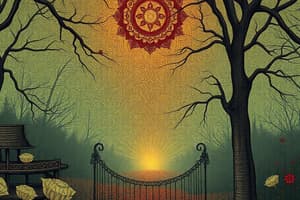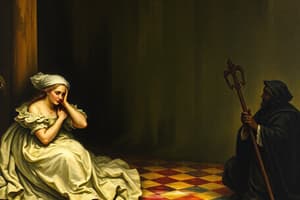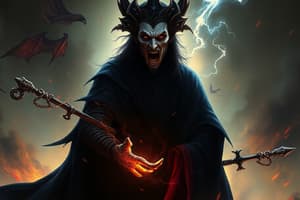Podcast
Questions and Answers
What does Lady Macbeth refer to with the quote, 'Out, damned spot! Out, I say!'?
What does Lady Macbeth refer to with the quote, 'Out, damned spot! Out, I say!'?
- Gender
- Appearance vs Reality
- Madness (correct)
- Ambition
What theme is represented by the line, 'My thought, whose murder yet is but fantastical'?
What theme is represented by the line, 'My thought, whose murder yet is but fantastical'?
- The Supernatural
- Betrayal
- Madness
- Ambition (correct)
What theme is highlighted by the quote, 'Fair is foul, and foul is fair'?
What theme is highlighted by the quote, 'Fair is foul, and foul is fair'?
- Madness
- Ambition
- Appearance vs Reality (correct)
- Betrayal
What does Macbeth mean when he says, 'The Prince of Cumberland! That is a step on which I must fall down, or else o'erleap'?
What does Macbeth mean when he says, 'The Prince of Cumberland! That is a step on which I must fall down, or else o'erleap'?
What theme is connected to the repetition of 'Macbeth! Macbeth! Macbeth!'?
What theme is connected to the repetition of 'Macbeth! Macbeth! Macbeth!'?
What theme is illustrated by the quote, 'Come to my woman's breasts and take my milk for gall'?
What theme is illustrated by the quote, 'Come to my woman's breasts and take my milk for gall'?
What is the context of Macbeth's question, 'Is this a dagger which I see before me?'
What is the context of Macbeth's question, 'Is this a dagger which I see before me?'
What theme is demonstrated by the line, 'I have no spur to prick the sides of my intent'?
What theme is demonstrated by the line, 'I have no spur to prick the sides of my intent'?
What theme is reflected in the phrase, '...and play the humble host'?
What theme is reflected in the phrase, '...and play the humble host'?
In the exchange, 'How goes my wife?' 'Why, well', what theme does it underscore?
In the exchange, 'How goes my wife?' 'Why, well', what theme does it underscore?
What is signified by the line, 'Greater than both by the all-hail hereafter'?
What is signified by the line, 'Greater than both by the all-hail hereafter'?
What theme does Lady Macbeth touch upon when she says, 'Come, you spirits that tend on mortal thoughts, unsex me here'?
What theme does Lady Macbeth touch upon when she says, 'Come, you spirits that tend on mortal thoughts, unsex me here'?
What does Macbeth confess with the line, 'Methought I heard a voice cry, 'Sleep no more, Macbeth does murder sleep''?
What does Macbeth confess with the line, 'Methought I heard a voice cry, 'Sleep no more, Macbeth does murder sleep''?
What is suggested by the line, ''Gainst nature still! Thriftless ambition, that wilt ravin up Thine own life's means!'?
What is suggested by the line, ''Gainst nature still! Thriftless ambition, that wilt ravin up Thine own life's means!'?
What theme does Lady Macbeth convey with, 'Your hand, your tongue; look like th' innocent flower, But be the serpent under't.'?
What theme does Lady Macbeth convey with, 'Your hand, your tongue; look like th' innocent flower, But be the serpent under't.'?
What does the Old Man mean by 'Tis said they eat each other.'?
What does the Old Man mean by 'Tis said they eat each other.'?
What does Macduff mean with 'Turn, hell-hound, turn!'?
What does Macduff mean with 'Turn, hell-hound, turn!'?
What is the message behind, 'O gentle lady, 'Tis not for you to hear what I can speak.'?
What is the message behind, 'O gentle lady, 'Tis not for you to hear what I can speak.'?
What is the implication of 'What's done cannot be undone. To bed, to bed, to bed.'?
What is the implication of 'What's done cannot be undone. To bed, to bed, to bed.'?
What does Macbeth mean by, 'I am in blood stepped in so far that should I wade no more, Returning were as tedious as go o'er.'?
What does Macbeth mean by, 'I am in blood stepped in so far that should I wade no more, Returning were as tedious as go o'er.'?
What does Macbeth mean with the statement, 'Never shake thy gory locks at me!'?
What does Macbeth mean with the statement, 'Never shake thy gory locks at me!'?
What does Macbeth express with 'Our fears in Banquo stick deep, and in his royalty of nature reigns that which would be feared.'?
What does Macbeth express with 'Our fears in Banquo stick deep, and in his royalty of nature reigns that which would be feared.'?
What theme does the quote, 'I come, Graymalkin! Paddock calls.' point to?
What theme does the quote, 'I come, Graymalkin! Paddock calls.' point to?
What theme does Malcolm convey when he states, 'Dispute it like a man.'?
What theme does Malcolm convey when he states, 'Dispute it like a man.'?
What does Macbeth refer to when he says, 'In the affliction of these terrible dreams that shake us nightly.'?
What does Macbeth refer to when he says, 'In the affliction of these terrible dreams that shake us nightly.'?
What is highlighted by Lady Macbeth's line, 'Thou wouldst be great, Art not without ambition, but without the illness should attend it.'?
What is highlighted by Lady Macbeth's line, 'Thou wouldst be great, Art not without ambition, but without the illness should attend it.'?
What does Malcolm's quote, 'Angels are bright still, though the brightest fell.' suggest?
What does Malcolm's quote, 'Angels are bright still, though the brightest fell.' suggest?
What is implied by Lady Macduff's statement, 'Wisdom! To leave his wife, to leave his babes?'
What is implied by Lady Macduff's statement, 'Wisdom! To leave his wife, to leave his babes?'
What is denoted by the quote, 'Thrice to thine, and thrice to mine, And thrice again to make up nine.'?
What is denoted by the quote, 'Thrice to thine, and thrice to mine, And thrice again to make up nine.'?
What theme is evident in Banquo's statement, 'You should be women, And yet your beards forbid me to interpret That you are so.'?
What theme is evident in Banquo's statement, 'You should be women, And yet your beards forbid me to interpret That you are so.'?
What does Macbeth express with, 'Prithee, see there! Behold, look, lo! How say you?'
What does Macbeth express with, 'Prithee, see there! Behold, look, lo! How say you?'
What does Banquo mean with, 'May they not be my oracles as well, And set me up in hope?'?
What does Banquo mean with, 'May they not be my oracles as well, And set me up in hope?'?
Flashcards are hidden until you start studying
Study Notes
Key Themes in Macbeth
Madness
- Lady Macbeth expresses profound guilt and mental torment with "Out, damned spot! Out, I say!" showcasing her descent into madness in Act 5, Scene 1.
- Macbeth's hallucination of a dagger symbolizes his unstable mind and escalating guilt in Act 2, Scene 1.
- Macbeth reflects on his inability to sleep peacefully, proclaiming he no longer can sleep after committing murder, indicating his mental breakdown in Act 2, Scene 2.
- Lady Macbeth's repetition of "What's done cannot be undone" highlights her helplessness and madness in Act 5, Scene 1.
- Macbeth appears disconnected from reality when he converses with ghosts at the banquet, as seen in Act 3, Scene 4.
Ambition
- Macbeth’s ambition is ignited by the witches' prophecies, revealing his conflicting thoughts about murder in Act 1, Scene 3.
- He acknowledges the dangers of unchecked ambition, "vaulting ambition which o'erleaps itself," illustrating the self-destructive nature of his desires in Act 1, Scene 7.
- Lady Macbeth questions Macbeth's ambition, suggesting he lacks the ruthlessness needed to seize power in Act 1, Scene 5.
- Macbeth admits, "I am in blood stepped in so far," indicating he feels trapped by his ambition in Act 3, Scene 4.
- Rosse suggests that ambition can lead to ruin when he discusses the consequences of ambition gone awry in Act 2, Scene 4.
Appearance vs. Reality
- The witches' chant "Fair is foul, and foul is fair" establishes the theme of deception and duality in Act 1, Scene 1.
- Lady Macbeth advises Macbeth to "look like th' innocent flower, but be the serpent under't," emphasizing the need for deceit in their plans in Act 1, Scene 5.
- Macbeth's fake hospitality during the banquet highlights the theme as he conceals his murderous intentions in Act 3, Scene 4.
- Malcolm’s observation, "Angels are bright still, though the brightest fell," implies the presence of deceit and hidden truths in Act 4, Scene 3.
Betrayal
- Macbeth's determination to become king leads him to betray King Duncan, declaring his need to "o'erleap" obstacles in Act 1, Scene 4.
- Macduff questions Macbeth’s loyalty, reflecting the theme of betrayal between former allies in Act 4, Scene 3.
- Lady Macduff’s lamentation over her husband's desertion underscores the personal impact of betrayal in Act 4, Scene 2.
- Macbeth’s fear of Banquo illustrates betrayal, as he acknowledges Banquo’s nature may threaten his reign in Act 3, Scene 1.
The Supernatural
- The witches' incantations, "Thrice to thine, and thrice to mine," underscore their manipulative control over the play's events in Act 1, Scene 3.
- Lady Macbeth calls upon supernatural forces to aid her in pushing Macbeth towards murder in Act 1, Scene 5.
- The witches' prophecies establish an ominous tone, suggesting fate and destiny govern characters' actions in the play.
- Macduff's confrontation with Macbeth, declaring "Turn, hell-hound, turn!" reinforces the clash between good and evil in Act 5, Scene 8.
Gender Roles
- Lady Macbeth's desire to "unsex" herself illustrates her rejection of traditional femininity in pursuit of power in Act 1, Scene 5.
- The portrayal of strong women like Lady Macbeth challenges the gender norms of the Elizabethan era, showcasing ambition and moral complexity.
- Macduff's remark to "dispute it like a man" reflects the societal expectations of masculinity in Act 4, Scene 3.
- Banquo’s comment on the witches highlights the ambiguity of gender roles, questioning their femininity due to their beards in Act 1, Scene 3.
Studying That Suits You
Use AI to generate personalized quizzes and flashcards to suit your learning preferences.




